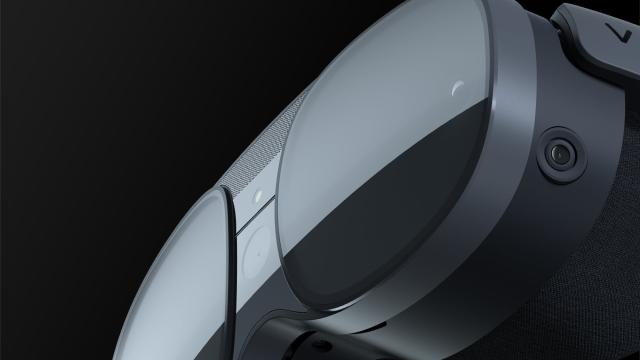According to The Verge, which was provided with a render of the new hardware, HTC is planning to reveal yet another consumer-focused virtual reality and augmented reality headset at CES 2023 next month, with features that will potentially rival the recently-announced Meta Quest Pro, including full-colour passthrough video.
Although the full announcement and reveal is still a few weeks away, HTC teased some early details about the unannounced hardware to The Verge. Like the Meta Quest Pro and older Quest models, the headset will be a self-contained, all-in-one unit (unlike HTC’s other current offerings, including the VIVE Focus 3, which requires a permanent connection to a gaming PC) with roughly two hours of battery life and support for controllers with six-degrees of detected motion, plus hand-tracking.
The unnamed headset will also include front-facing and side-facing cameras, allowing the wearer to still see their surroundings in full colour, facilitating augmented reality and mixed reality experiences. That was arguably the most compelling reason to splurge on the recently announced, $AU2,449.99 Quest Pro, as Meta’s older headsets only provide a grainy, black and white video feed of a user’s surroundings to help ensure they don’t crash into anything (or anyone). However, the new HTC headset will potentially outperform the competition, with HTC promising enough detail to allow users to still read text on computers and smartphones through the passthrough video, while the addition of a depth sensor will also make it much better at accurately mapping a user’s surroundings and inserting virtual content into it.
The render of the new headset doesn’t provide too many additional details, although it doesn’t look substantially different to the recent HTC Vive Flow, which looked like an over-sized pair of safety glasses. That goes with hints HTC posted this October that its next big product will be compact and lightweight.
Go small or go home. pic.twitter.com/PUqqKn4V5E
— HTC VIVE (@htcvive) October 6, 2022
HTC will also reveal details about the new headset’s pricing at CES, but Shen Ye, the company’s global head of product, told The Verge that it doesn’t plan to subsidise the hardware by collecting and selling users’ data, and as a result the new hardware will probably be considerably more expensive than the $AU629.99 Meta Quest 2. That’s good news for those who value their privacy, but it could make the new headset a tough sell for most consumers, who seem happy to trade privacy for heavily discounted hardware.
